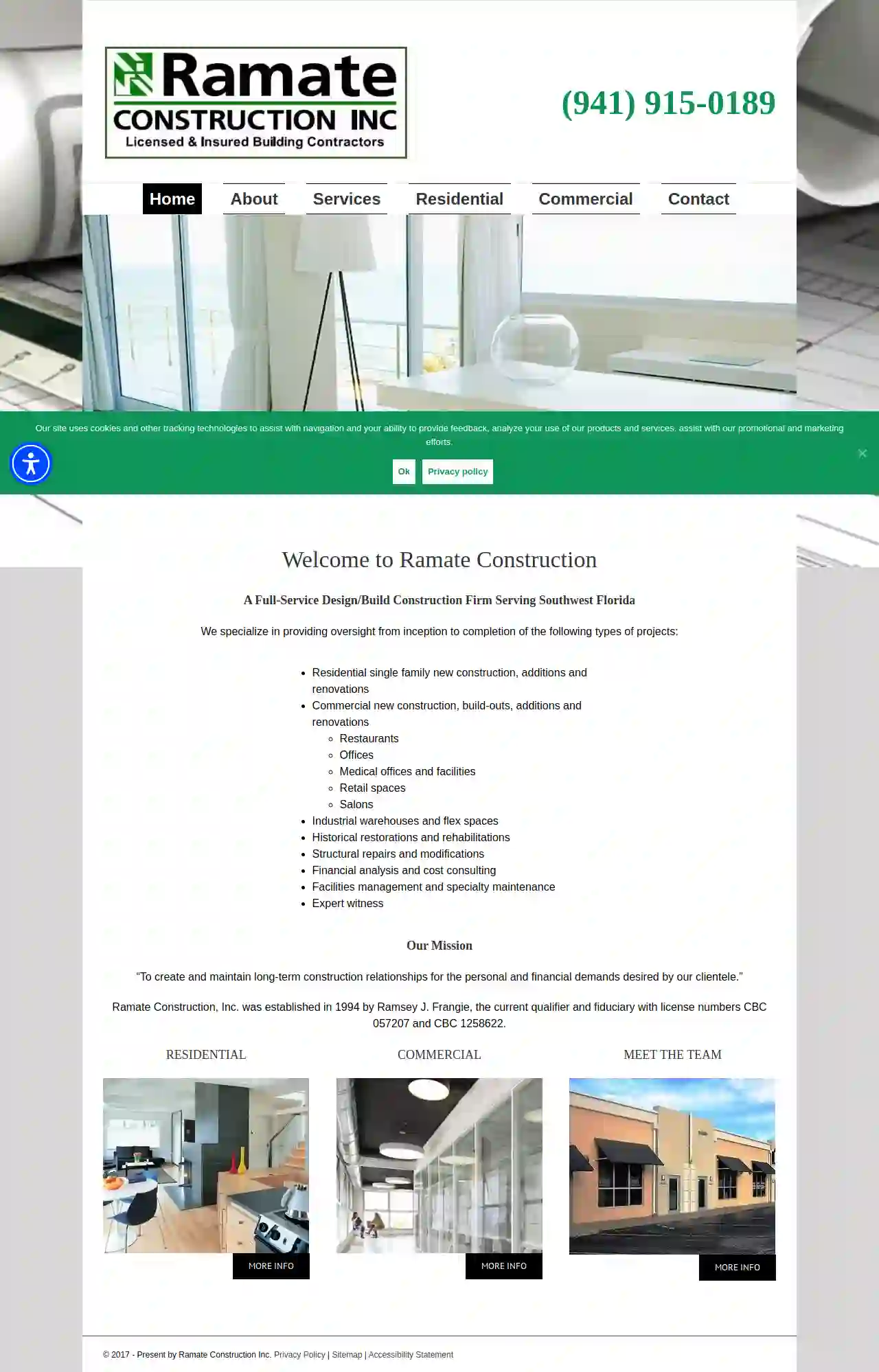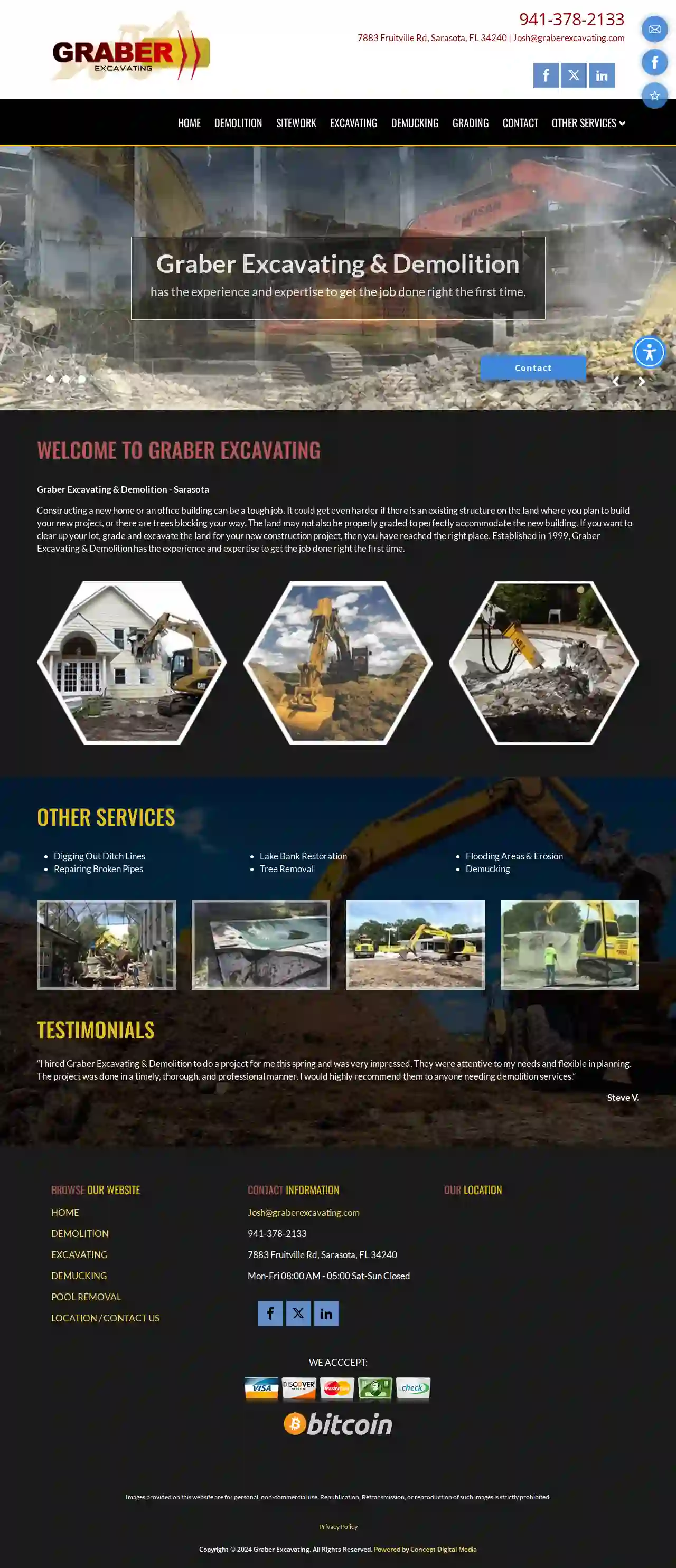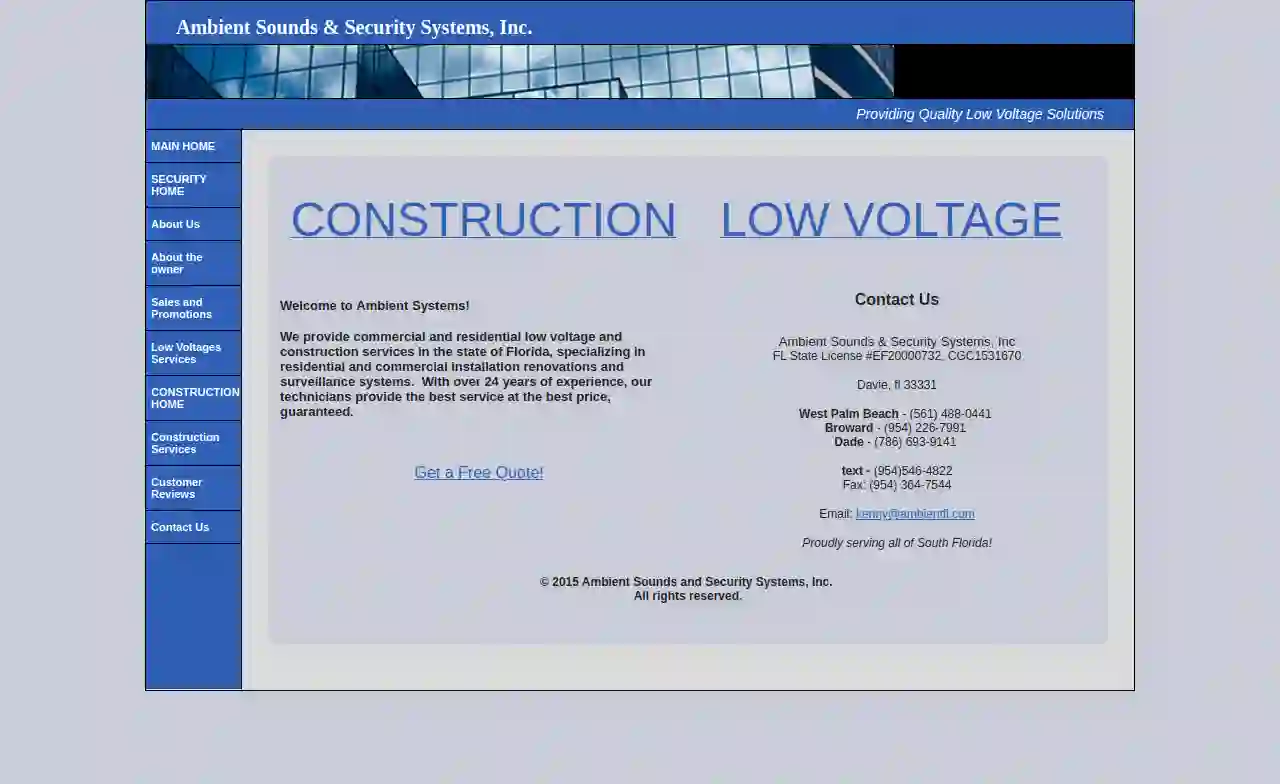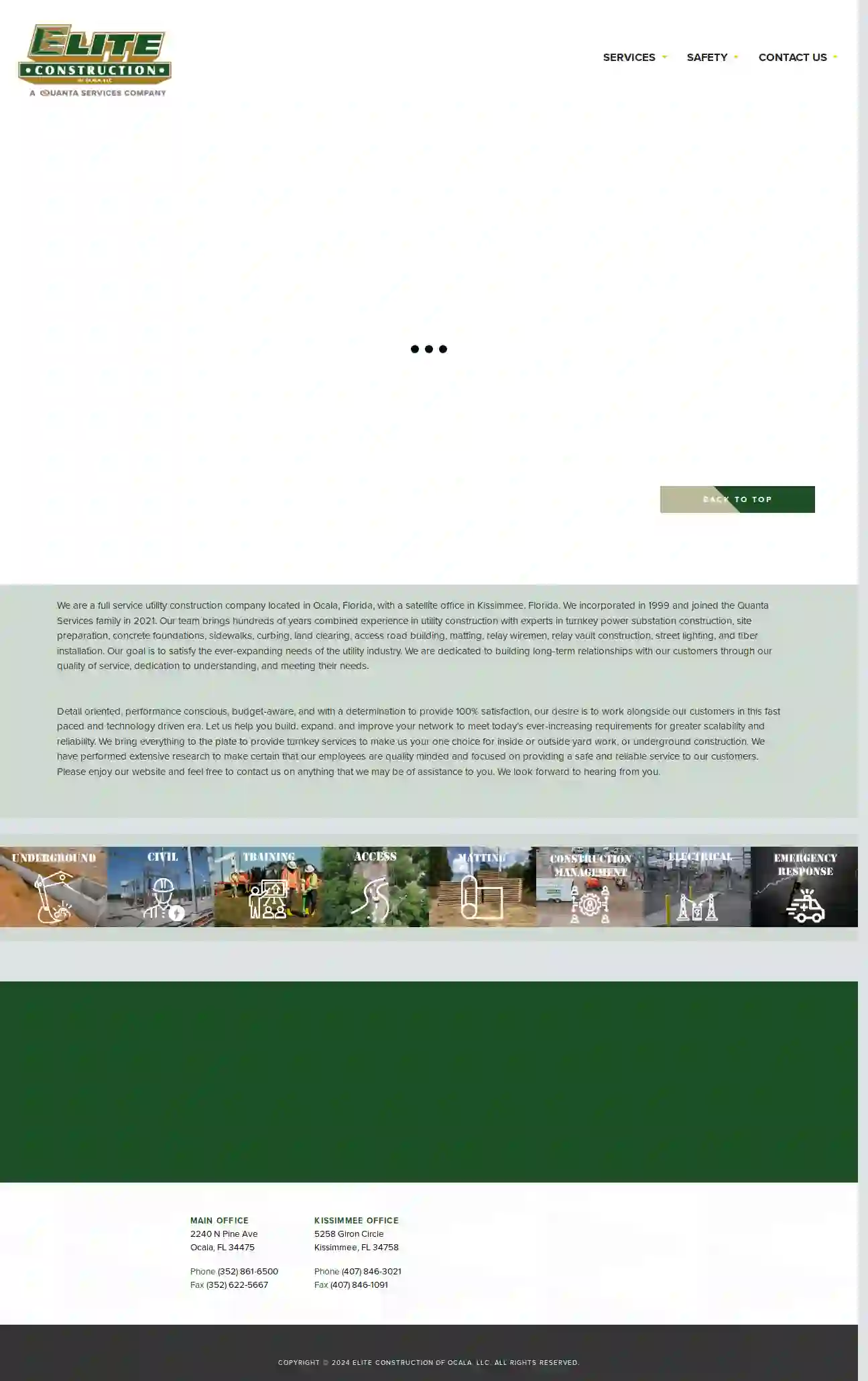Demolition Contractors Horizon West
Top Demolition Experts in Horizon West
Receive up to 3 Structure Demolition quotes for your project today! Compare profiles, reviews, accreditations, portfolio, etc... and choose the best service.

Ramate Construction
4.36 reviewsSarasota, USWelcome to Ramate Construction A Full-Service Design/Build Construction Firm Serving Southwest Florida We specialize in providing oversight from inception to completion of the following types of projects: Residential single family new construction, additions and renovations Commercial new construction, build-outs, additions and renovations Restaurants Offices Medical offices and facilities Retail spaces Salons Industrial warehouses and flex spaces Historical restorations and rehabilitations Structural repairs and modifications Financial analysis and cost consulting Facilities management and specialty maintenance Expert witness Our Mission “To create and maintain long-term construction relationships for the personal and financial demands desired by our clientele.” Ramate Construction, Inc. was established in 1994 by Ramsey J. Frangie, the current qualifier and fiduciary with license numbers CBC 057207 and CBC 1258622.
- Services
- Why Us?
- Gallery
Get Quote
Things & Stuff LLC Tractor Excavation Land Clearing and Forestry Mulching
532 reviews2506 Timbercreek Loop E., Lakeland, 33805, USAbout Things & Stuff LLC A Lakeland, Florida native, I've been self-employed since I was about 12 years old. I started with my own neighborhood lawn business, then expanded to pallet wall and furniture building. Eventually, I moved into home repairs and rehabs. But after purchasing my first tractor, there was no turning back. I established my own LLC for my tractor, skid steer, and excavation company, becoming fully licensed and insured. I continue to add equipment to make my services more affordable (by avoiding rental costs). Recently, I've added dumpster rental and demo to my services, launching Junk That Stuff as a new division. I'm committed to continuous learning and growth in my business, ensuring I'm better equipped to serve you, my valued customer. Things & Stuff is my passion, and honesty and reliability are the cornerstones of my company. I've been working with earth moving machinery for a significant amount of time. From a young age, I've honed my skills to meet the diverse needs of my clients. As a small business, I've experienced steady growth while maintaining a personal touch, providing my customers with the attention they deserve and expect. Customer satisfaction is my top priority, and my goal is to build lasting relationships with repeat customers. "~Things & Stuff, owned and operated by Jonathan Edwards"
- Services
- Why Us?
- Our Team
- Gallery
Get Quote
Lakeland Excavation
Lakeland, USYour Excavating Specialist Expert excavation services for a variety of projects Excavating Specialists Expertise and Experience Reliability and Timely Completion Great Customer Service Lakeland Excavation is your trusted partner for all your excavation and land management needs in Lakeland, FL, and surrounding areas. Located in Lakeland, we are providing services from shrub removal to other services such as full building demolition! At, Lakeland Excavation we offer a wide range of services including excavation, land clean up, tree removal, demolition of small buildings on land, house foundation, digging, grading, land clearing, tree removal, stump removal, shrub removal, and site preparation. With a commitment to excellence and a focus on customer satisfaction, our team brings expertise and dedication to every project we undertake. Quality and Expertise We're Providing Top-tier Excavation Services in Lakeland & Surrounding Areas. Whether you're a homeowner looking to clear your property for a landscaping project, or a developer in need of site preparation services, we have the skills and resources to get the job done right. Our team of experienced professionals is dedicated to delivering top-quality workmanship on every project. We have the knowledge and skills to handle a wide variety of excavation and land management tasks, ensuring that your project is completed to the highest standards. Excavating Excellence, Grounded in Quality Lakeland Excavation is committed to providing a helping hand for all your excavation and land management needs. Uncompromising Quality Commitment to Excellence Top-Tier Workmanship Where quality, reliability, and customer satisfaction converge for unparalleled results. We specialize in a wide range of services to cater to the diverse needs of our clients. Our excavation services encompass everything from digging and grading to house foundation work, ensuring that your construction projects start on solid ground. Additionally, we offer land clearing to prepare your property for development, as well as tree, stump, and shrub removal to create a clean canvas for whatever landscaping or construction project you have in mind. We take the time to understand your specific needs, working with you to deliver solutions that not only meet but exceed your expectations. Our aim is to build lasting partnerships with our clients, based on trust, reliability, and a shared commitment to success. You Can Count On Lakeland Excavation Excavating Specialists Comprehensive Services Expertise and Experience Great Customer Service Quality Workmanship Reliability and Timely Completion Safety and Compliance When you choose Lakeland Excavation, you can have peace of mind knowing that your project will be completed on time and within budget. At Lakeland Excavation, customer satisfaction is at the heart of everything we do. We take pride in our open communication and transparency, ensuring that your experience with us is positive and stress-free. We are committed to delivering top-quality results on every project. Our dedication to precision and attention to detail ensures that your project is completed to the highest standards. If you have any project big or small that requires our expertise get in touch with Lakeland Excavation today! Unearth Excellence with Lakeland Excavation: Your Premier Excavation and Land Clearing Service in Lakeland, FL and Surrounding
- Services
- Why Us?
- Gallery
Get Quote
J&T Bush Hogging, Land Clearing and Excavation LLC.
4.25 reviewsMadison, 32340, USGet Ready to Build on Your Land J&T Bush Hogging, Land Clearing and Excavation can prepare your site for your construction project. Turning your rugged, overgrown land into a fully prepared construction site doesn't have to be difficult. When you work with J&T Bush Hogging, Land Clearing and Excavation, it can be a simple and streamlined process. Our land clearing company offers a wide range of services in the Madison, Monticello & Live Oak, FL area. What can we do for you? Our team can prepare your residential or commercial site for a construction project. You can count on us to: Clear your land Demolish a building Excavate for a foundation We can also provide services like brush hogging, tree pruning and utility trenching. Call 850-673-8071 now to explore all of the options with a local excavation contractor. We're available 24/7 for emergency calls. You can also email us by using the form on the Contact Us page. After a Storm Passes, Who Can Clear the Damage? Our land clearing company is available 24/7 in the Madison, Monticello & Live Oak, FL area. Why choose J&T Bush Hogging, Land Clearing and Excavation? When you need a land clearing company, you need one with experience and high-quality equipment. Our crew has more than 20 years of experience and a stock of Bobcats, excavators and other vehicles and machinery. Reach out to our excavation contractors today to get a free estimate on any of our services. Please note that an estimate fee may apply for clients outside of our normal service radius.
- Services
- Why Us?
- Gallery
Get Quote
Evergreen Grading
512 reviews6807 Visitors Cir suite A, Orlando, 32819, USWelcome to Evergreen Grading, Land Grading experts Get A Free Quote Today WELCOME TO EVERGREEN GRADING Evergreen Grading growth has prompted us into large bulk excavations, professional construction, and large scale demolition. Having a devotion to providing exceptional quality service into every job establishes us as the best grading and excavation company in Orlando. With our machinery vehicles, every job is able to be executed with the highest quality, timeframe, and skill. Drawing over years of varied and in-depth industry experience demolishing and cleaning domestic and commercial sites. We deliver personalized services at very competitive prices. Working within your set budget, timeframes, and location. Sure, the services we offer takes grit and grunt, but it also demands expertise and technical experience. That’s why Evergreen Grading has always taken it seriously – training and building an experienced team of professionals you can trust, shaping our systems and facilities and assembling some of the best equipment in the land to reflect our safe eco-friendly approach. We thrive on challenging and complex projects. We have delivered hundreds of client-pleasing projects across Orlando and its surroundings by providing solutions that work and delivering the people power and equipment to see them through.
- Services
- Why Us?
- Gallery
Get Quote
Graber Excavating
4.959 reviews7883 Fruitville Rd, Sarasota, FL, 34240, USWelcome to Graber Excavating Constructing a new home or an office building can be a tough job. It could get even harder if there is an existing structure on the land where you plan to build your new project, or there are trees blocking your way. The land may not also be properly graded to perfectly accommodate the new building. If you want to clear up your lot, grade and excavate the land for your new construction project, then you have reached the right place. Established in 1999, Graber Excavating & Demolition has the experience and expertise to get the job done right the first time.
- Services
- Why Us?
- Testimonials
- Gallery
Get Quote
Ambient Construction and Design, Inc
53 reviewsDavie, fl, 33331, USAmbient Sounds & Security Systems, Inc. Providing Quality Low Voltage Solutions Welcome to Ambient Systems! We provide commercial and residential low voltage and construction services in the state of Florida, specializing in residential and commercial installation renovations and surveillance systems. With over 24 years of experience, our technicians provide the best service at the best price, guaranteed. Ambient Sounds and Security has been in business since 2007, proudly serving the South Florida area. We are dedicated to excellence in security solutions and superior customer service. About the Owner Hi, I'm Kenneth Monteagudo. Since 1992, Kenneth was heavily involved in the world of construction. Starting from the age of 12, he was working in the family security systems business. In 1998 he moved to Rhode Island where he furthered his security systems knowledge and his general contracting experience began. After spending 5 years working for Cottage and Castles contracting during the summers and Sonitrol during the winter, he returned to Florida with a strong work ethic. That work ethic and personable service has served him well. From low voltage to construction, Kenneth has proven to be an asset in all that is home and commercial improvements. Today he owns and runs Ambient sounds and security systems and Ambient Construction and Design.
- Services
- Why Us?
- Our Team
- Gallery
Get Quote
JBE Sitework llc
52 reviewsTallahassee, USLEADERS IN QUALITY CONSTRUCTION AND INFRASTRUCTURE SERVICES JBE Sitework LLC is owned and operated by Bryan Eubanks. Based in Tallahassee, Fl, we have extensive experience in precision grading, demolition and land clearing. Whether your project is large or small, we have the experience and resources to get it done!
- Services
- Why Us?
- Gallery
Get Quote
Rodriguez Bros Tree Service
541 reviewsMiami, USAt Rodriguez Bros Tree Service, we are dedicated to providing top-quality tree cutting and care services. With over 10 years of experience, our team of professionals is committed to keeping your property safe and beautiful. Our services include tree removal, tree trimming and pruning, tree maintenance, tree health and care, tree cabling and bracing, arborist consultations, land clearing and brush removal, and storm cleanup. We prioritize safety, professionalism, and customer satisfaction, and our team is committed to delivering top-notch tree care services while preserving the natural beauty and integrity of your landscape.
- Services
- Why Us?
- Gallery
Get Quote
Elite Construction of Ocala, Inc.
4.242 reviews2240 N Pine Ave, Ocala, FL 34475, 34475, USElite Construction of Ocala, LLC A Quanta Services Company Elite Construction of Ocala, LLC is a full-service utility construction company located in Ocala, Florida, with a satellite office in Kissimmee, Florida. We incorporated in 1999 and joined the Quanta Services family in 2021. Our team brings hundreds of years of combined experience in utility construction with experts in turnkey power substation construction, site preparation, concrete foundations, sidewalks, curbing, land clearing, access road building, matting, relay wiremen, relay vault construction, street lighting, and fiber installation. Our goal is to satisfy the ever-expanding needs of the utility industry. We are dedicated to building long-term relationships with our customers through our quality of service, dedication to understanding, and meeting their needs. Detail-oriented, performance-conscious, budget-aware, and with a determination to provide 100% satisfaction, our desire is to work alongside our customers in this fast-paced and technology-driven era. Let us help you build, expand, and improve your network to meet today's ever-increasing requirements for greater scalability and reliability. We bring everything to the plate to provide turnkey services to make us your one choice for inside or outside yard work, or underground construction. We have performed extensive research to make certain that our employees are quality-minded and focused on providing a safe and reliable service to our customers. Please enjoy our website and feel free to contact us on anything that we may be of assistance to you. We look forward to hearing from you.
- Services
- Why Us?
- Gallery
Get Quote
Over 22,076+ Excavation Companies onboarded
Our excavation contractors operate in Horizon West & surrounding areas!
ExcavationHQ has curated and vetted Top Excavation Contractors near Horizon West. Find the most reliable contractor today.
Frequently Asked Questions About Demolition Contractors
- Experience: Look for companies with a proven track record and years of experience in the demolition industry.
- Licensing and Insurance: Ensure the contractor is properly licensed to operate in your area and carries adequate insurance to protect you from liability.
- Safety Record: Inquire about their safety protocols and accident history. A reputable contractor prioritizes safety.
- References and Reviews: Ask for references from past clients and check online reviews to gauge their reputation and customer satisfaction.
- Professionalism: Choose a company that communicates clearly, provides detailed estimates, and has a courteous and responsive team.
- General Liability Insurance: Covers bodily injury or property damage to third parties caused by the contractor's negligence.
- Workers' Compensation Insurance: Provides benefits to workers injured on the job.
- Pollution Liability Insurance: Covers costs associated with environmental contamination caused by demolition activities.
- Professional Liability Insurance: Protects against claims of negligence or errors in professional services, such as demolition planning or consulting.
- Project Assessment: The demolition contractor evaluates the structure, site conditions, and project requirements.
- Permitting: Obtain necessary demolition permits from local authorities.
- Site Preparation: Secure the site, disconnect utilities, and remove any valuable or reusable items.
- Hazardous Material Abatement: Professionally remove asbestos, lead paint, or other hazardous materials if present.
- Demolition: Execute the chosen demolition method, bringing down the structure safely and efficiently.
- Debris Removal and Site Cleanup: Sort, process, and dispose of demolition debris responsibly. Clean up the site to prepare it for future use.
How do I find a reputable demolition contractor?
What is the importance of insurance in demolition projects?
How long does a demolition project take?
What are the steps involved in a typical demolition process?
How do I find a reputable demolition contractor?
- Experience: Look for companies with a proven track record and years of experience in the demolition industry.
- Licensing and Insurance: Ensure the contractor is properly licensed to operate in your area and carries adequate insurance to protect you from liability.
- Safety Record: Inquire about their safety protocols and accident history. A reputable contractor prioritizes safety.
- References and Reviews: Ask for references from past clients and check online reviews to gauge their reputation and customer satisfaction.
- Professionalism: Choose a company that communicates clearly, provides detailed estimates, and has a courteous and responsive team.
What is the importance of insurance in demolition projects?
- General Liability Insurance: Covers bodily injury or property damage to third parties caused by the contractor's negligence.
- Workers' Compensation Insurance: Provides benefits to workers injured on the job.
- Pollution Liability Insurance: Covers costs associated with environmental contamination caused by demolition activities.
- Professional Liability Insurance: Protects against claims of negligence or errors in professional services, such as demolition planning or consulting.
How long does a demolition project take?
What are the steps involved in a typical demolition process?
- Project Assessment: The demolition contractor evaluates the structure, site conditions, and project requirements.
- Permitting: Obtain necessary demolition permits from local authorities.
- Site Preparation: Secure the site, disconnect utilities, and remove any valuable or reusable items.
- Hazardous Material Abatement: Professionally remove asbestos, lead paint, or other hazardous materials if present.
- Demolition: Execute the chosen demolition method, bringing down the structure safely and efficiently.
- Debris Removal and Site Cleanup: Sort, process, and dispose of demolition debris responsibly. Clean up the site to prepare it for future use.